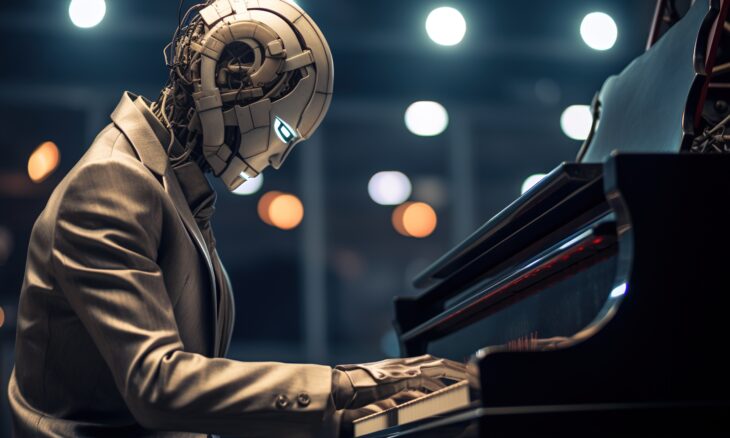How AI Is Revolutionizing the World of Music
Artificial Intelligence (AI) is revolutionizing the music industry, merging technology with art in unprecedented ways. From bringing back the voices of iconic artists to creating entirely new compositions, AI is transforming how we experience, produce, and interact with music. But this revolution also raises important questions about authenticity, creativity, and the future of the art form itself.
AI and the Revival of Music Legends
One of the most notable recent examples of AI’s power is the release of “Now and Then,” a new song by The Beatles. This track featured the voices of John Lennon and George Harrison—decades after their deaths. AI was used to extract and restore Lennon’s demo recordings and integrate them with the work of the remaining Beatles, Paul McCartney and Ringo Starr.

It’s like being back in the room with John, hearing his voice come alive again. It’s the magic of technology, but also a bit of a reminder of how fleeting time is.”-Sir Paul McCartney described the experience as “both exciting and eerie,” stating in an interview with the BBC.
The accompanying music video also employed AI to incorporate restored footage of Lennon and Harrison, seamlessly blending the past with the present.
Similarly, the Rolling Stones used AI to enhance archival footage for their latest video projects. AI tools such as Topaz Video Enhance and Adobe’s Sensei technology were employed to clean up decades-old visuals, presenting them in stunning high-definition.
AI’s Role in Modern Music Creation
AI isn’t just about preserving history—it’s also driving innovation in music creation. Platforms like OpenAI’s Jukebox and AIVA are capable of composing original music in the style of various genres and artists. These tools analyze vast datasets of musical patterns, chord progressions, and lyrical themes to create music that feels distinctly human.
AI doesn’t replace creativity—it enhances it. It gives me tools I never imagined having as an artist.” –Grammy-winning producer Taryn Southern famously collaborated with AI to create her 2018 album I AM AI. In an interview with The Verge
Independent artists are also benefiting from AI-powered platforms like Amper Music, which allow musicians to generate backing tracks or experiment with new sounds at a fraction of the cost of traditional production.
AI’s Impact on Music Consumption
AI’s influence doesn’t stop at creation; it extends to how we discover and consume music. Streaming platforms like Spotify and Apple Music use machine learning algorithms to curate personalized playlists. These algorithms analyze user preferences to recommend songs and artists, transforming the way listeners engage with music.
AI allows us to understand our users on a deeper level, offering them music they didn’t even know they wanted to hear.” According to Daniel Ek, CEO of Spotify, personalization is key to the platform’s success
The result? A music discovery experience tailored to individual tastes, keeping listeners engaged and artists more visible.
Restoring the Past and Preserving the Future
AI is also being used to restore and preserve older music. Organizations like Abbey Road Red are leading the charge in developing AI tools to digitize and enhance aging audio recordings. These advancements not only protect historical archives but also make them accessible to modern audiences.
One notable example is the restoration of Nina Simone’s live performances, where AI cleaned up audio tracks and enriched sound quality, bringing a fresh vibrancy to timeless classics.
Ethical and Artistic Challenges
Despite its potential, AI’s role in music raises complex ethical questions:
- Authenticity vs. Imitation: Can an AI-generated song truly capture the emotion and depth of human creativity?
- Copyright and Ownership: Legal frameworks struggle to keep up with questions about who owns the rights to AI-generated compositions.
- Job Displacement: As AI handles tasks like composing and producing, what happens to the livelihoods of human musicians and engineers?
We need to tread carefully. AI can democratize music creation, but it also risks commodifying it in ways that strip away its emotional essence.”According to musicologist David Hesmondhalgh, speaking to The Guardian
Conclusion: AI as a Creative Partner
AI is undoubtedly transforming the music world, offering tools that extend the boundaries of creativity while preserving and reimagining the past. From resurrecting the voices of John Lennon and Nina Simone to helping independent artists craft professional tracks, AI is proving to be a powerful ally in music.
However, it’s crucial to remember that the magic of music lies not just in technology but in the human touch. AI should be viewed as a partner in the creative process, amplifying artistry rather than replacing it.
To dive deeper into how AI is reshaping creativity, check out our related articles on AI in Film Production and AI’s Role in Visual Arts.









